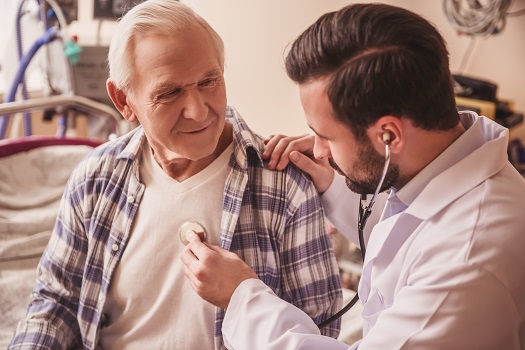
Men's Health Awareness Month is June 2021
June is Men's Health Awareness month. Men have specific health issues that could arise if they aren't taking care of themselves. For this reason, it's important to encourage men, especially those ignoring their health and annual doctor's checkups, to keep up with their doctor appointments. These preventative doctor's appointments can help men interceptive larger health issues.
Over fifty-five percent of men over 55 years old do not regularly see their primary care physician for annual appointments. Exercising regularly, going to your annual physical, and taking care of your overall health will help you live longer. Below we will go over health concerns that affect men's health the most.
Heart Health 
People age 65 and older are much more likely to suffer from heart related issues such as heart attack, heart disease, and heart failure. As you age, changes to your body make these much more common if you don't take care of your health. Your heart rate during physical activity can't handle beating as fast. Physical changes also happen to the heart such as fatty buildup in the arteries, however the impacts of this buildup can be reversed to lower or delay your risk of heart disease. Eating healthy and safely exercising will help with lowering your chances of a heart related problem.
Signs of Heart Disease
- Pain, numbness, and/or tingling in the shoulders, arms, neck, jaw, or back
- Shortness of breath when active, at rest, or while lying flat
- Chest pain during physical activity that gets better when you rest
- Lightheadedness
- Dizziness
- Confusion
- Headaches
- Cold sweats
- Nausea/vomiting
- Fatigue
- Swelling in the ankles, feet, legs, stomach, and/or neck
- Reduced ability to exercise or be physically active
- Problems doing your normal activities
Prostate Health
As your age your prostate gets larger, starting at the size of a walnut when you're younger and growing up to the size of a lemon. With the increased size (common) it can cause issues with urinating. Your doctor can help you with treatment if this becomes a problem, however there are more severe problems to watch signs for, such a prostate cancer. Getting a prostate exam, may not be the most comfortable thing, but it is extremely important to get done to prevent serious problems in the future.
Signs of Prostate Cancer
- The need to pee often, especially at night
- Trouble starting or stopping a stream of urine
- A weak stream or one that starts and stops
- Leaking pee when you laugh or cough
- Not being able to pee standing up
- Pain or burning when you pee
- Blood in your pee
- Pressure or pain in your rectum
- Pain or stiffness in your lower back, hips, pelvis, or thighs
Stroke
Strokes are the leading cause of death in men. Strokes kill nearly the same amount of men as prostate cancer and Alzheimer's combined. Although this is a scary fact, the good news is that 4 in 5 strokes can be prevented. A stroke happens when blood flow to an area of the brain is blocked or when a blood vessel in the brain bursts. High blood pressure is a major risk factor that contributes to the cause of strokes. Other risk factors include, smoking, being overweight, diabetes, excessive alcohol consumption, and not enough physical activity. Strokes can be prevented by making lifestyle changes such as healthy eating, physical exercise, quitting smoking/drinking and maintaining healthy blood pressure and cholesterol.
Signs of Stoke
- Weakness or numbness of the face, arm, or leg on one side of the body
- Loss of vision or dimming (like a curtain falling) in one or both eyes
- Loss of speech, difficulty talking, or understanding what others are saying
- Sudden, severe headache with no known cause
- Loss of balance or unstable walking, usually combined with another symptom
Depression 
Men experience depression but their symptoms may be expressed differently than women. Typically, men who are depressed may appear to be angry or aggressive rather than sad. Their families and friends may not recognize the anger or aggression as depression symptoms. Men are also less likely to recognize their depression and seek help for it which can make it difficult on their loved ones. If you see these symptoms in yourself or a family member, reach out and see if they will seek help to better their mental health.
Signs of Depression
- Drinking more or taking drugs
- Avoiding family or social situations
- Working obsessively without taking proper breaks
- Finding it hard to keep up with work or family responsibilities
- Becoming more controlling or abusive in relationships
- Engaging in risk-taking behavior, such as gambling or unsafe sex
- Attempting suicide
Alcohol
Excessive alcohol consumption can have a lot of negative effects on your health. Men are two times more likely to binge drink than women are which can lead to significant health problems. Not only can it impact your health physically, but it can impact your mental health and social relationships with your family and friends.
Health Conditions that Arise from Excessive Consumption
- Heart disease
- Anemia
- Dementia
- Cirrhosis (Liver)
- Cancer
- Seizures
- Depression
- High blood pressure
- Nerve damage
- Pancreatitis
- Gout
- Infectious diseases
Conclusion
As you can see it's very important to take your health seriously, especially as you age. Changing your lifestyle to a healthier lifestyle will help prevent and/or reverse the negative health concerns that may arise. Senior men need to be proactive with their health and make sure they see their doctors and specialists as a preventative measure.